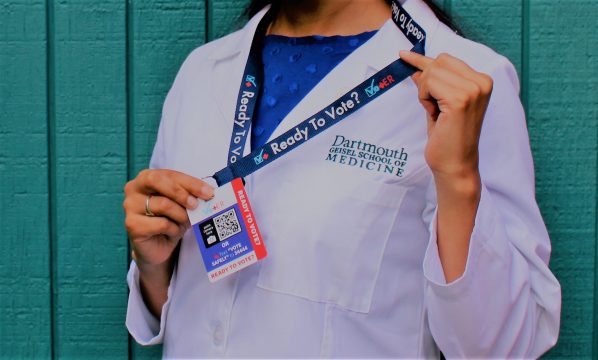The new badge dangles from the white coats of second-year medical students Priscila Cevallos ’23 and Amal Cheema ’23, offering a timely question, “Ready to vote?” This election year, amid a pandemic that puts everyone’s health at risk, students at the Geisel School of Medicine are asking patients if they have a plan to keep themselves safe while voting.
The voter safety efforts began in August when Geisel joined VotER’s Healthy Democracy Campaign, a nonpartisan effort to register patients in community clinics and hospital emergency rooms. Ahead of the election, over fifty medical schools nationwide have partnered with VotER to ensure that patients can sign up to vote and cast their ballots in a healthy way if they can this November.
“The pandemic has clearly demonstrated that health underlies our ability to pursue life and its activities,” explains Cheema, who co-leads the VotER initiative alongside Cevallos, with the support of Geisel Student Government. “Many people have not felt comfortable pursuing basic errands due to the inherent risks of COVID-19 exposure. Our communities however have come together to ensure that basic needs can be met and likewise, that the pandemic will not disenfranchise people of a foundational act woven into the fabric of American life.”

When patients come into the clinic to talk about their blood pressure or other health concerns, medical students are also assessing whether they feel prepared to vote safely the upcoming election. “As the only medical school in the state, Geisel has a duty to ensure our patients, families, and friends are adequately informed and prepared to vote safely,” says Cevallos.
Patients scan a QR code from the student’s VotER badge which links them directly to their official Secretary of State website, where they can register to vote or request a vote-by-mail ballot. The platform also guides users to important information about registration deadlines, election dates, and what to bring to their local polling place on election day.
Additional fliers and contactless materials advertising the safe voting campaign are deliberately placed in low acuity areas of partner medical centers, such as the waiting area of Vermont’s Good Neighbor Health Clinic, where patients are not typically presenting for emergent complaints. The entire process is voluntary and nonpartisan, allowing patients to engage the voter registration materials on their own terms and with their own time.
The VotER project does not interrupt the student or physician’s workflow, since the patient completes the registration process themselves.
New Hampshire does not offer online registration, but patients may save and then print their voter registration form before presenting it to their Town Clerk. The QR code provides state-specific information depending on the user’s location, meaning that Geisel students who are clerking at hospitals in nearby Vermont or Maine can help register eligible voters in those states, too.
“Our advocacy efforts in New Hampshire have revealed critical gaps in voting policies in the state, especially in the context of the health and safety considerations brought about by COVID,” says Cevallos. “New Hampshire is one of nine states in the country without online voter registration, one of seven states without pre-Election Day voting, and the only state in New England without voter registration at the DMV.”
Indeed, VotER reflects a larger movement in healthcare that pushes doctors and nurses to address the underlying social conditions — such as poverty, homelessness, and health insurance status — that make their patients sick in the first place. Supporters of this movement say medical professionals are better prepared to advocate for patients when they appreciate “civic health” as among the upstream causes of sickness.
“Patient advocacy is integral to the healthcare profession,” says Cevallos. “COVID has highlighted the role of healthcare provider advocates in spaces not traditionally seen as our domain.”
With this nonpartisan initiative, Geisel medical students hope to elevate patient voices and empower people to reclaim their ability to exercise their autonomy in voting. “Voting is all about community members coming together to make a decision for the community,” explains Cheema. “While voting may not have an obvious direct impact on a patient’s illness experience, we know that policies, as shown by the pandemic, greatly affect health outcomes.”